• The project could lose Germany's participation
• Officially, the Nabucco consortium never talked about the exit of RWE
• Germany and Hungary reaping a lot of benefits from Russian pipelines Nord Stream and South Stream
German group RWE is about to leave the Nabucco consortium and intends to sell its stake of 16.1% in the project company to OMV, according to "Focus", which quotes sources in the industry. The deal will take place by the end of the year, the quoted sources also estimate.
Nabucco spokesman, Christian Dolezal, said: "We can't comment on the structure of the shareholders while the Board of Directors of Nabucco has not reached a decision, and we thank you for your understanding in that matter. The Nabucco Consortium is making important progresses in the negotiations with the Shah Deniz II Consortium concerning the Cooperation Agreement. This will lead to the further consolidation of the Nabucco project".
RWE, the second largest utility group in Germany, has announced in May, that it is reviewing its strategy for the Nabucco pipeline, which is designed to bring in gas from the Caspian Sea to Europe, through Turkey, Bulgaria, Romania, Hungary and Austria.
Also in spring, Hungarian company MOL announced that it does not have the necessary funds to participate in the share capital increase of the Nabucco project company. At the time, it was also rumored that MOL would leave the project, as Hungary strongly supported Russia's competing project - South Stream. MOL is still a shareholder of Nabucco, and the rest of the shareholders (Turkey, Romania, Bulgaria, Austria and Germany) would cover equal parts of the amount pertaining to the share capital increase.
Sources from the energy market claim that Germany and Hungary benefit greatly from the Russian gas which Gazprom brings in at a good price through Nord Stream. Thus, the two countries are no longer interested in Nabucco, even though they did not pull their political support (transit countries signed an intergovernmental agreement).
Nabucco is an expensive pipeline (about 8 billion Euros for an annual transport capacity of 31 billion cubic meters), and the shareholders need to contribute the equivalent of 30% of their total investment out of their own resources.
However, yesterday, Reuters wrote that if it were to leave the Nabucco project, RWE would no longer be able to implement its plans to sell Net4Gas of the Czech Republic, as this would reduce its value. "It is a bad news for the investors in South Eastern Europe if RWE pulls out of Nabucco. Without it, Net4Gas is no longer that valuable", says Heino Hammann, analyst at NordLB.
RWE has made it its plan to sell assets of about 7 billion Euros by the end of next year to reduce its leverage and to invest more in Germany, which has decided to abandon the production of nuclear energy. In 2011, Net4Gas accounted for approximately 11% of the net profit of RWE and is a transport network of 3,600 km, which brings Russian gas from Slovakia to Germany, while also supplying the Czech Republic.
Germany has an excellent relationship with Russia, implemented in the realization of Nord Stream, a pipeline which will double its capacity and avoid the stormy Ukraine, and Hungary, Bulgaria, and Serbia are partners of Gazprom in building South Stream. Even though they strongly support the Russian pipeline, the countries neighboring Romania did not pull their political support for Nabucco, but they aren't rushing to finance the European gas pipeline through the companies they own.
Energy market experts claim that the political strategies around the gas pipelines are tangled and that the appearance of the rumor that RWE might exit the Nabucco project isn't coincidental, as Gazprom has lobbied heavily in the past year to promote its projects (Nord Stream and South Stream) and to denigrate Europe's projects intended to help Europe diversify its natural gas supply sources (including shale gas). Yesterday, Gazprom signed partnerships for a period of 30 years to deliver natural gas to major Turkish companies, which will also receive an important 40% discount, according to the press in the region.
"The club" of countries playing both ends has recently seen a new addition: Turkey. In the past year, Turkey has dealt a powerful blow to the Nabucco project, allying with Azerbaijan to build its own pipeline and competing with the European pipeline in obtaining the natural gas from Shah Deniz II deposit. Thus, Nabucco has shrunk by half, while awaiting for the final answer from the Azeri.
BP PLC and its partners in the consortium which will exploit the Shah Deniz II deposit have recently announced that they are interested in buying 50% of Nabucco. Al Cook, the vice-president of BP, said that two parties had talks on this subject.
The Nabucco Political Committee, which includes the representatives of Nabucco in the transit countries, has confirmed the political support for the Nabucco project and for the existing Intergovernmental Agreement, in a meeting hosted by the Ministry of Energy in Austria, precisely on the date Nord Stream was launched (October 2012).
The meeting was attended by the European Commissioner for Energy, Günther Oettinger, the energy ministers of Bulgaria, Hungary, Romania and Turkey and representatives of the shareholders of Nabucco. The Ministry of Industry and Energy in the Republic of Azerbaijan, Natig Aliyev, also attended and made a presentation of the evolution of the project from the perspective of the producer.


















































